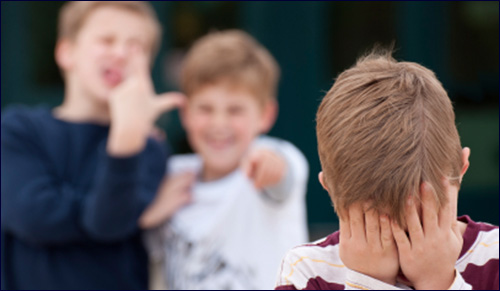 Iran’s Attack on Israel
Iran’s Attack on Israel


4 min read
Shaking off our indifference to bullying.
Too many times I have picked up a recent paper to find a sad or even tragic article describing the ordeal of a child who has been bullied. The New York Times recently told the story about a 15 year old boy who was just beginning his sophomore year in Greenwich High School:
Boys picked on Bart Palosz almost from the moment his family moved to this affluent town seven years ago. They taunted him for his accent – he was born in Poland – pushed him into the bushes or down stairs and smashed his new Droid cellphone, his sister said. After the first day of school, Bart killed himself with the family shotgun. Ms. Palosz said the family had pleaded with school officials to intervene. “Every time there is an incident, there is a meeting and nothing is done afterwards. We asked for help over and over.”
Of course we feel badly when we hear about bullying. There are workshops given on recognizing the signs and articles written about why children bully. But a eulogy given at the funeral of Bart by a family friend urged adults to take more responsibility:
“His death can only have meaning if the bullying and indifference that led to his feelings of isolation and despair are confronted. The simple observation that kids can be cruel is not action. It is an excuse, an inequitable pardon for those whose actions led us being here today and an excuse for not teaching our children well.”
Have we grown indifferent to these stories of exclusion and taunting? Have we lost our sensitivity and come to expect that some children will be extraordinarily mean? Maybe that is just the way our children are today, we wonder. If this is true then what does this say about us, the parents who have forged a path for this generation? Have we grown used to crass behavior, kids who maim with their tongues and young adults who use social media to mock and isolate their peers? If we remain silent, are we not failing to teach our children well?
If your child is fortunate enough to be blessed with a gift of popularity, skilled at sports, or finds school work easy, you have an obligation to teach your child well. These gifts are given by God and we have a responsibility to make this world brighter through our talents. A captain of a team can choose a child who is feeling badly about himself and is usually standing on the side, unnoticed. A popular girl can make room for another at lunch or on the bus and make a classmate feel as if they are a human being instead of an overlooked piece of old furniture. A child who is a math whiz can help a struggling student gain confidence and skills.
Instead of growing up in a bubble, we can help children reach out and grow kinder and more sensitive. How can we possibly allow our children to have a party knowing that they will be celebrating while another child is home crying?
Shrugging our shoulders and saying that this is just how kids are these days is simply unacceptable. We are responsible.
I still believe in the kindness of children. I still have faith in the spark that lies within every child. It is up to us adults to seek out that light and ignite a flame of compassion within the heart and soul of every child.
A few years ago, a Special Olympics took place in Seattle, Washington. A group of Down’s syndrome children stood at the starting line. The signal sounded and the kids began to run. Each step was a personal triumph. Just a few minutes into the race, though, a little girl fell down. She sat on the track and began to cry. The children who were running ahead heard her cries. Together they turned around. They extended their hands and helped this child stand up on her feet. They then all linked their arms and together walked proudly to the finish line.
Think about it. Who really is the disabled one here? These children teach us the greatest lesson of all. When we can stop what we are doing and feel the pain of another; when we find within ourselves the ability to extend our hands to one who has fallen – physically or emotionally – we prove that we are complete. It is our obligation to teach our children well.
